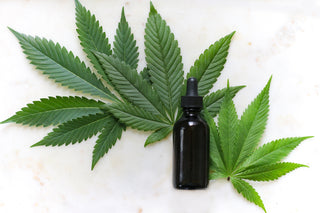Let's start by answering the most common question: no, CBD WILL NOT GET YOU HIGH. This is because it’s not psychoactive. “Psychoactive” substances affect the way you think and feel, which can affect the way you behave. Common legal psychoactive drugs are alcohol, tobacco and various prescription medications. THC is psychoactive, which is where the confusion around CBD comes from – marijuana contains both CBD and THC.
So if CBD does NOT affect the way you think, feel and behave, what does it do?
CBD IS USED IN THE TREATMENT OF ANXIETY, DEPRESSION, SCHIZOPHRENIA, CANCER, NAUSEA, VOMITING, EATING DISORDERS, PAIN, ARTHRITIS, INFLAMMATION, EPILEPSY AND SEIZURES.
According to the British Journal of Clinical Pharmacology, the most common uses of CBD are in the treatment of anxiety, schizophrenia, nausea, vomiting, inflammation and epilepsy. The most common proven benefits of CBD include:
PAIN, INFLAMMATION & ARTHRITIS
Natural pain relief is perhaps the most common use for CBD. With an opioid epidemic currently taking place in Australia, many chronic pain sufferers are turning to a safer option: cannabis.
According to this 2012 study published by the Journal of Experimental Medicine, CBD may represent a significant step forward in the treatment of chronic pain, especially in those suffering from MS (multiple sclerosis). This is because CBD inhibits neuronal transmission in pain pathways, which is a fancy way of saying “it stops the message getting through”, as this is what pain is: a message from your brain to your body that something’s wrong. This is useful in everyday life (when you cut or burn yourself, it’s a message to STOP!), but when pain becomes chronic and requires constant treatment, removing it through CBD can be a life-changing experience. Tens of thousands of Aussies have already experienced this, and yet our government continues to insist on criminalising these innocent people. A further inflammation-related ailment which almost 4 million Australians suffer from is arthritis. As this article demonstrates, CBD helps arthritis in many ways.
ANXIETY & DEPRESSION
Beyond Blue reports that 1-in-5 Australians experience mental health challenges in any given year, while almost 1-in-2 will deal with a mental health condition during their lifetime. Since three million Aussies currently live with depression or anxiety, it’s no wonder that many of them are turning away from expensive and debilitating pharmaceutical products to find a natural solution. The side effects of pharmaceuticals include sexual dysfunction, agitation, headaches, drowsiness and insomnia, while common medications such as benzodiazepine are highly addictive and often introduce users to whole new set of worries.
CBD represents a whole new approach mental health challenges, from mild anxiety all the way up to crippling depression. This 2011 study had a fascinating outcome; it set up a scenario in which 24 people who had never tried CBD were studied in a public speaking test. An hour and a half before the test commenced, people were given either CBD or a placebo. Those who received the placebo demonstrated high levels of anxiety, stress and cognitive impairment, while those who had received CBD saw all of those symptoms significantly reduced. In short, they simply relaxed and calmed down.
According to this research published in the Brazilian Journal of Psychiatry, people suffering from social anxiety disorder strongly benefit from CBD. The researchers suggest that CBD may be an effective treatment for PTSD (post-traumatic stress disorder), obsessive compulsive disorder and panic disorder.
CANCER
Responsible for 3-in-10 deaths, cancer is the second most common cause of death in Australia. Sufferers are increasingly turning to CBD not just for its treatment of cancer itself, but for relief from the crippling effects of chemotherapy. There are a number of studies which demonstrate CBD’s considerable strength in treatment of cancer; in both this study and this one CBD attacked only the cancerous cells and inhibited their growth, while leaving the non-cancer cells alone – a far better solution than chemo, which ravages the body of those who undergo it.
NAUSEA, VOMITING AND EATING DISORDERS
In this 2012 study the British Journal of Pharmacology proved that CBD helps to remove nausea and vomiting, something which folk medicine practitioners have known for millennia. The effects are often quite dramatic, leading to long-lasting and sustained relief. This is another way in which CBD helps cancer patients, as chemotherapy often results in nausea and lack of appetite. This is why it’s likewise helpful in cases of bulimia and anorexia nervosa.
EPILEPSY & SEIZURES
With between 3% and 3.5% of Australians experiencing epilepsy at some point in their lives, over 250,000 Australians currently live with epilepsy. Often, the most heartbreaking cases are those which involve children, who represent approximately 40% of the population suffering from epilepsy.
In 2014 Stanford University conducted a survey that demonstrated dramatic results in children affected by seizures. Before using CBD, 63% of the children had been treated with anti-epileptic pharmaceutical medication. 84% of the children saw a reduction in their seizure frequency while taking CBD. 11% completely stopped seizing, 42% saw massive benefits (a reduction in seizure frequency of over 80%), and 32% saw a reduction in seizures of 25-60%. Although side-effects included drowsiness and fatigue, there were other reported benefits in terms of mood, alertness and sleep.
DIABETES
An estimated 5.1% of Australians are diagnosed with diabetes – that’s 1.2 million Aussies over the age of 2. Many suffer needlessly, and CBD is providing many with new hope.
Between 2005 and 2010, a study published in the American Journal of Medicine examined almost 5,000 adults. The results were impressive: marijuana use was associated with 16% lower insulin levels. Additionally, smaller waist circumferences were linked to marijuana use, which is a crucial factor in preventing the onset of diabetes.
THE CHALLENGES AROUND CBD
The main issue with CBD is that much of the scientific research which has been done on it is through analysis of its effects on mice, instead of humans. Quite aside from ethical issues around animal testing, the fact is that humans are different, and our bodies don’t always react the same as other animals. This is why responsible testing needs to occur in order to find out everything we can about its uses, benefits and side-effects.
More widely speaking, a number of studies have shown that long-term recreational use of cannabis can have negative effects on mental health. Frontiers in Psychiatry published a report in 2013 which claims that permanent psychological disorders can be linked with cannabis, depending on frequency of use, the potency of the cannabis used, the age someone begins using and the sensitivity of the individual in question.
The vast majority of recreational cannabis users never have to worry about such things, but in some rare cases, there can be undesirable effects such as anxiety and paranoia. Encouragingly, studies are beginning to show that CBD counteracts these adverse effects, but more research is needed.
Suffering from ailments related to skin, brain, joints, digestion, blood, heart, lungs, hair, immune system? Our 100% Australian Hemp Seed Oil helps.

